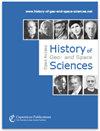Contribution to the knowledge of early geotechnics during the twentieth century: Arthur Casagrande
IF 0.4
4区 哲学
Q4 GEOSCIENCES, MULTIDISCIPLINARY
引用次数: 1
Abstract
Abstract. Arthur Casagrande (1902–1981) is one of the main people responsible for the geotechnics that we know today. Born in Haidenschaft, now Slovenia, he went to the United States in 1926 to participate in major civil engineering projects: he graduated in 1924 from the Technische Hochschule in Vienna, Austria. On this visit to the USA he met Karl Terzaghi (1883–1963), the father of soil mechanics and geotechnology, who taught him the basic concepts of this discipline to which Casagrande dedicated the rest of his life. In his early years of work with Terzaghi, Casagrande focused on research studies, such as the development on the limits of Atterberg published in 1932, and the development of equipment for soil trials, such as the Casagrande spoon also developed in 1932. Casagrande not only dedicated himself to research in his early years, but he also carried out studies throughout his professional career, such as those carried out on liquefaction, which he began in 1937 and continued throughout his life. Casagrande not only made important contributions in the field of geotechnology, but also lectured at Harvard University, which he joined in 1932. He also consulted and was involved in several projects for the Army Corps of Engineers of the United States. In addition, Casagrande made an important contribution to the 1st International Conference of Soil Mechanics and Foundations Engineering that took place at Harvard University in 1936. The aim of this paper is to analyze, through the biography of Casagrande, his contribution to the field of geotechnics, based on his research, teaching, and consulting work. Moreover, Casagrande influenced other important people in the field, such as Terzaghi, Peck, and even the work with his brother Leo, and, of course, the influence of these people on Casagrande's team.Arthur Casagrande对二十世纪早期岩土工程知识的贡献
摘要Arthur Casagrande(1902-1981)是我们今天所知的岩土工程的主要负责人之一。他出生于现斯洛文尼亚的海登沙夫特,1926年前往美国参与重大土木工程项目:1924年毕业于奥地利维也纳的技术学院。在这次美国之行中,他遇到了土壤力学和岩土工程之父Karl Terzaghi(1883-1963),他教会了他这门学科的基本概念,Casagrande为此奉献了余生。Casagrande在与Terzaghi合作的早期,专注于研究,如1932年出版的关于阿特伯格极限的开发,以及土壤试验设备的开发,如1932也开发的Casagrander勺子。卡萨格兰德早年不仅致力于研究,而且在他的职业生涯中也进行了研究,比如他于1937年开始并贯穿一生的关于液化的研究。卡萨格兰德不仅在地球技术领域做出了重要贡献,而且还在哈佛大学演讲,他于1932年加入哈佛大学。他还为美国陆军工程公司咨询并参与了几个项目。此外,Casagrande对1936年在哈佛大学举行的第一届土壤力学和基础工程国际会议做出了重要贡献。本文的目的是通过卡萨格兰德的传记,结合他的研究、教学和咨询工作,分析他在岩土工程领域的贡献。此外,卡萨格兰德影响了该领域的其他重要人物,如特扎吉、佩克,甚至是他与兄弟利奥的合作,当然还有这些人对卡萨格兰德团队的影响。
本文章由计算机程序翻译,如有差异,请以英文原文为准。
求助全文
约1分钟内获得全文
求助全文
来源期刊

History of Geo- and Space Sciences
GEOSCIENCES, MULTIDISCIPLINARY-HISTORY & PHILOSOPHY OF SCIENCE
CiteScore
1.50
自引率
33.30%
发文量
10
审稿时长
50 weeks
期刊介绍:
The scope of History of Geo- and Space Sciences (HGSS) is to document historical facts and knowledge and to improve awareness of the history of geoscience. The knowledge of the development of geosciences and their experimental methods and theories in the past can improve our current understanding and may stimulate current research. It is encouraging for young scientists to read biographical material of historical figures in their research area. It is important as well to learn that history of science is an integrated part of the ongoing research in their research area. Another important aim of the journal is the association of historical retrospective and current research.
 求助内容:
求助内容: 应助结果提醒方式:
应助结果提醒方式:


